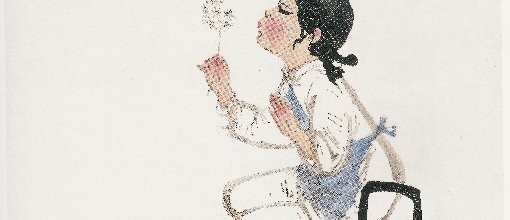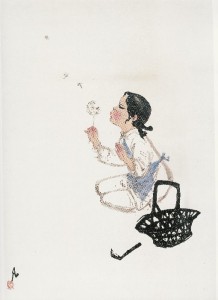
Xujun Eberlein – a writer you should read now!
 In 2006 I spent time in Beijing. It was a confusing, demanding and ultimately frustrating experience, compounded by my inability to speak the language. China left me with no clear impressions but with many fragmented or faceted ones, so I was keen to read Xujun Eberlein’s collection Apologies Forthcoming, to see if it would help me recalibrate the kaleidoscope of my own, highly limited, experience of China.
In 2006 I spent time in Beijing. It was a confusing, demanding and ultimately frustrating experience, compounded by my inability to speak the language. China left me with no clear impressions but with many fragmented or faceted ones, so I was keen to read Xujun Eberlein’s collection Apologies Forthcoming, to see if it would help me recalibrate the kaleidoscope of my own, highly limited, experience of China.
One of the most satisfying things, to me, in reading these stories, was their contemporary resonance – unless you’ve been to China in the past few years and seen the pace of change alongside the timelessness of certain belief systems, it is almost impossible to understand what little we hear of Chinese politics and economics, but as Xujun has it, ‘that was how the pointy tip of the awl emerged from the pocket’ – often all we see in the West is the tip of the awl, the purpose and value of the tool are hidden from us inside the cloaking behaviours of China’s public face. As I write this, China’s third space mission is about to undertake a space walk. The idea of a space walk is stale news, it’s hardly made it onto national TV or radio here in the UK, but for China, and Chinese acquaintances of mine, this is a vindication of something that the west never even thinks about – the decades of investment China has made in independent space travel. If we think about it at all, we think China ‘missed the boat’ or ‘shows off’ with this insistence, but the truth is much more nuanced. For many Chinese this is a validation of years of sacrifice and effort, a culmination not just of a project, but of a team, that, like the team involved in the Olympic Games, has created a Chinese vision of something already well established in the West. Team is a very important concept in China, and one of the themes that emerges so beautifully from Xujun’s work is that of the nature of the team, whether it’s a class of students or a group of villagers, and that the preparedness of an individual to sacrifice their preferences or beliefs to that of the group is so taken for granted that it isn’t even considered laudable – it is the only thing to do.
I harp on about this so much because Chinese literature is – from the very limited experience I have of it – both a diaspora of note and one of the most fascinating and productive literary forms of our generation. Whether you read Ha Jin or Wei Hui or today’s interviewee, you will find not just illumination about China, but forms of writing, stylistic devices, techniques and tropes that are taken for granted in the literature of that culture but forgotten or not yet discovered in our own. Such richness is a rarity and Xujun’s own writing style, which is relaxed and open with a focus only on salient detail, is a refreshing change from the dense emotional jumbling that seems to mark much of modern Western writing.
There’s a confidence about Xujun’s writing which is based not so much on power or bravura as on having something worth saying, and knowing how much needs to be said. Like the pointy tip of the awl, Xujun Eberlein finds the right places to expose the truth and when I had read her collection I realised that it would have better prepared me for China than a dozen guidebooks. I had so many questions to ask Xujun that it was difficult to narrow them down to an interview that wouldn’t take her a month to answer, but I’m confident that the questions and answers below will give you some insight into this very fine writer whose work deserves a really wide audience.
1. Apologies Forthcoming has a central theme, or perhaps a central reef onto which all the stories are somehow driven – and that theme is the Cultural Revolution and its effects on Chinese society. Many Westerners, myself included, have had a one-sided view of this amazing social phenomenon. How much did it affect you, growing up in China?
Tremendously. It ordained my life trajectory and formed what I am now. It was in that period when I grew from a child to an adult. It broke completely my dream of becoming a great mathematician, yet it made me mature early and become a writer instead. It also broke my family. My dearest big sister died as a Red Guard. I witnessed my parents being denounced and humiliated. Adding more to this is the fact that the participants I personally knew of were all good people during normal time. So the question of what made people behave as they did during that abnormal time has always intrigued me.
2. The stories in the collection are not linked, but as I’ve said, they have a thematic relationship – was it evident to you as you wrote them that this was going to be the defining feature of each one, or did you discover this linkage when you came to select material for publication?
When I began to write the stories, I did not know there was going to be a book. Later it came as a surprise that the stories were all thematically related. But in retrospect, I really shouldn’t have been surprised, because I was simply writing about things that happened during the most significant period of my life.
3. In recent decades, China has changed massively, does it feel to you that you have a responsibility to ‘represent’ China to the West through your fiction? For example, there are forms of systematized violence in many of the stories which may shock or surprise readers – did you hesitate to expand on this aspect of Chinese life during certain periods of the Revolution?
Not at all. One good thing about America is that I feel no constraints on subject or content as a writer here. In daily life, sometimes, when I hear people expressing their naïve, over-simplified, or ignorant views about China, I have the urge to tell them “No, things weren’t like that.” However that kind of sentiment becomes irrelevant in the process of writing fiction. I don’t think fiction should carry any agenda. My mind is occupied by plot, characterization, choice of details, etc., and has no room for a superficial agenda. Good fiction should let the characters speak, not the author. As far as readers are concerned, the only consideration that affects my writing is that my story not bore them.
4. The collection is very beautiful – it features four illustrations, which is very unusual for adult fiction. Did you have to persuade your publisher to include the paintings or was including artwork part of your initial submission to them?
In China, I grew up reading novels which often had illustrations.
I guess I did not realize this is unusual in the US. My opening story, “Snow Line,” alludes to a piece of art titled “Dandelion.” The artist, Mr. Wu Fan, is a renowned “literati artist” in Sichuan, a very classic kind. “Dandelion” was his signature work and won a gold medal in the 1959 international block prints competition. During the Cultural Revolution that gold medal became a criminal indictment for him and nearly killed him.
Mr. Wu is a friend of my parents, and his daughter is one of my closest friends. The genesis of “Snow Line” actually came from the daughter; she had been the model for the little girl in “Dandelion.” So when my publisher was doing the typesetting, the thought came to me that artwork would add a nice dimension to the story.
I discussed this with my publisher, Joe Taylor, and he was willing to accommodate my wish, though he said he could only do black-and-white. I didn’t think that would be a big issue for block prints. Last summer when I visited Chengdu, I asked for Mr. Wu’s permission to include his work in my book, and he generously agreed. I ended up using three works from him, each fits nicely with one of the stories. His daughter did the sketch for “Men Don’t Apologize.” It looks great in the book and I’m very thankful to Joe and the Wu family.
5. You’re working on a memoir at present – how do you decide what material is ‘fiction’ and what is ‘creative non-fiction’?
That’s a very good question. I don’t think I ever tried to divide true-life materials that way. Those can be used in either fiction or non-fiction where I see fit. In fact some of the same details appeared in both of my fiction and non-fiction works, though they are presented in different styles. I do think fiction and creative non-fiction have their own distinguishable presentation styles.
6. You’re a short story writer, a memoirist and a journalist: is it easy to move between these disciplines?
No, not very easy. Especially if I have been writing non-fiction for a while, it takes a lot of mood brewing for me to switch to the fiction state of mind.
7. What language do you dream in? And does language, in your experience, shape the way you think and communicate – can you say things in Chinese that you could not say in English?
Dreams are an interesting thing. I think for most of the time I dream in Chinese, but sometimes in English as well. It’s also strange that the settings in my dreams are almost always in China, but the characters are both Chinese and Americans.
Certainly there are many things that I can say in one language but not the other. This is true of both Chinese and English. But when I’m awake, I mostly think in English now. If I want to think in Chinese, it takes some deliberate effort to switch.
8. If you were abandoned on a desert island, with just one book for company, what would it be?
Chairman Mao’s little red book? 🙂 Seriously, when thinking about it, there are few books that I want to read a second time, mostly because I am easily bored by repetition. Perhaps one exception would be The Complete Works of Shakespeare – in English this time around.
Xujun’s short story collection, Apologies Forthcoming, is available from Amazon and all good bookstores.
Dandelion by Wu Fan, courtesy of Xujun


2 Comments
Jerry Waxler
30th September 2008Thanks for this, Kay. I am a big fan of Xujun, and after I read her book of stories I spent many weeks contemplating it for the essay I wrote on my blog. It holds up well to such exploration, sharing deeper resonance the more one tries to get from it. I agree her insights are better than a guidebook. After you read these stories of growing up during the Cultural Revolution, another window into that world is through the memoir “Man on Mao’s Right,” by Ji Chaozhu. I wrote an essay about that on my blog as well.
By the way, I love the title of your blog. It makes me crazy with curiosity. People don’t talk nearly enough about neurosis anymore. 🙂
Jerry Waxler
Memory Writers Network
Mark Anthony Jones
1st October 2008Interesting review. Thanks. I have ordered a copy, and look forward to reading it.